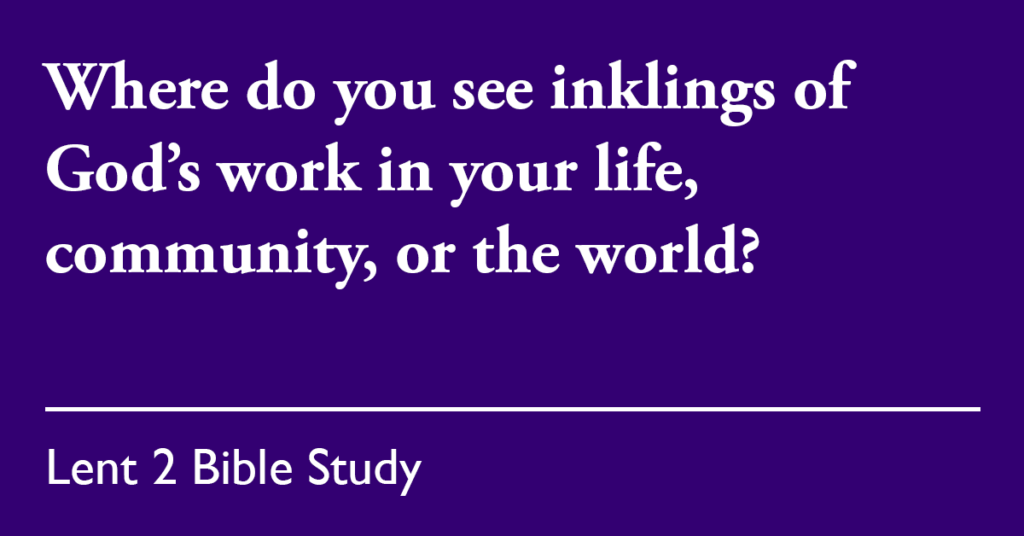This page is available in: Español
Bible Study: Lent 2 (C) – 2022
March 13, 2022
RCL: Genesis 15:1-12,17-18; Psalm 27; Philippians 3:17-4:1; Luke 13:31-35

Genesis 15:1-12, 17-18
Here, we encounter a frustrated and exhausted Abram. After receiving word from the Lord that he and his offspring will be blessed, Abram and his family endure a seemingly never-ending onslaught of difficult circumstances. Due to famine, they are forced to leave their home. In Egypt, Abram becomes convinced that his wife Sarai’s beauty is a threat to his survival, so he devises a scheme that results in her being trafficked into Pharaoh’s harem. After leaving Egypt, Abram and his nephew, Lot, become embroiled in a family feud. By the next chapter, war has broken out, and Lot has been captured by rival forces. Abram is forced to go to battle. He survives it, only to discover that he and his wife, already elderly, do not seem to be able to conceive.
How can he trust that God will keep God’s promises under such conditions?! God’s track record isn’t great so far.
But then God shows up. God asks Abram to prepare a covenant “cutting” ritual. God visits the sacrificial site in the form of flame, passing between the dismembered animals as a formal show of God’s commitment to the promise. But even when God literally shows up, Abram is left stupefied in a terrifying darkness. Maybe his grief and trauma have clouded his vision. Or maybe the reality of God’s presence displaces these griefs in its own show of overwhelming power.
- When have you doubted God’s promise or presence?
- Are there times in your life where you struggled to see God at work in the moment, but see God’s presence more clearly in hindsight?
- What scriptures and stories sustain you in times of doubt?
Psalm 27
Scholars suggest that the Psalms are a collection of liturgical songs and poems written and compiled over several centuries. Like our hymnbook, they speak to the circumstances of the moment, and take on new meaning as each generation incorporates them into their life of worship. Psalm 27 offers a powerful example of praise and supplication. It begins with a description of God’s fulfilled promises before moving on to relational and ritual descriptions of the writer’s understanding of God. It ends with requests for God to protect the writer and keep them close to God. The many orientations and heartfelt expressions of the writer’s joys, hopes, and fears remind us that, in the ebbs and flows of our own lives, we can share it all with God and one another.
- What is one of your favorite hymns and why?
- When has it been easy for you to give thanks to God?
- What fears and struggles do you bring to God?
Philippians 3:17-4:1
Like Abram, we encounter Paul in a state of duress. Likely imprisoned in Ephesus at the time of writing, we can sense his urgent desire for God to fulfill God’s promises. Paul tells his siblings in Christ that the bodily humiliation they may experience at the hands of earthly society and earthly powers is being transformed through Christ. He reminds the church at Philippi that their political identity as Roman subjects does not define who they are; Christ is their king and heaven is their true home. In the midst of oppression and confusion, they can claim the hope of Christ and his kingdom.
- What identities do you hold? Which ones do you wish you could reject or adopt?
Luke 13:31-35
In his Luke commentary, John T. Carroll writes: “Eschatological completion may still lie ahead…but salvation is occurring in hope instilling ways through Jesus’ presence now.” In the first part of this passage, we see Jesus’ focus on the present and near-future, a reminder that God’s promises break into our daily lives even as we await their final fulfillment. God is on the move: there is reason to hope.
But what is this talk about prophets and Jerusalem? Jesus suggests that those who kill the prophets are not outsiders, but powerful and persuasive people within his own religion and culture. In other words, the biggest threats to social and religious transformation are those within the movement who – whether obsessed with their own status or fearful of the repercussions of change – stifle the prophetic voices in our midst.
- Where do you see inklings of God’s work in your life, community, or the world?
- When have you felt compelled to speak out? How did your family, friends, or other church members respond?
This page is available in: Español
Don’t forget to subscribe to the Sermons That Work podcast to hear this sermon and more on your favorite podcasting app! Recordings are released the Thursday before each liturgical date.
Receive Free Weekly Sermons That Work Resources!
This page is available in: Español


